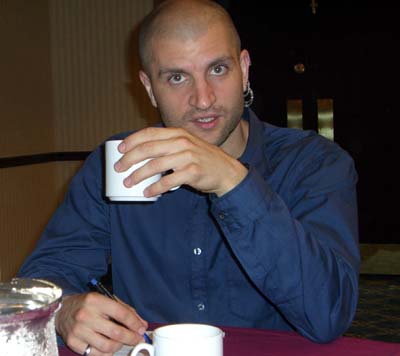I got an overall impression that Readercon is a more highbrow convention than ArmadilloCon. Or maybe it's just that I didn't go to those kind of panels at the ArmadilloCon. Or it could be that China Mieville's presence makes everything highbrow. I mean, suddenly the panelists, instead of just chatting about cool things in science fiction and fantasy, are "deconstructing" books and talking about "alternate readings of texts". Probably because socialist politics and literary theory go hand in hand.Not only you start hearing how most of the "traditional" fantasy (as opposed to "new weird" fantasy Mieville writes) upholds conservative beliefs and reinforces the status quo of class disparity (e.g. by promoting such archetypes as The Good King). No: in addition to that, you hear about how the very notion of a novel having a protagonist is somewhat bourgeois and reactionary. I don't know about you, Dear Reader, but my first thought was "Whaaaat?" Well, yes: the presence of a protagonist implies that one person, a hero, can single-handedly change the world (as they often do in SF and fantasy), and therefore reinforces the notion that our happiness or unhappiness is solely the consequence of our own actions, and never of the society, hereby removing a need for social change.

China Mieville at Readercon 2006, a science fiction convention in Boston
In SF and fantasy, therefore, a cigar is never just a cigar. Willingly or unwillingly, the genre has become an agent in the class struggle.
I'm semi-joking, of course. While I indeed heard China Mieville say things I recounted above, I also heard him say the opposite: namely, that he does NOT like reading SF and fantasy as an alegory, and that in order to get the most out of the genre, you must read it as if it was literal truth. (Suspension of disbelief and all that, I guess.)
I may have to think how to reconcile those views. Or, most likely I'll just forget it as the demands of daily life take over.






